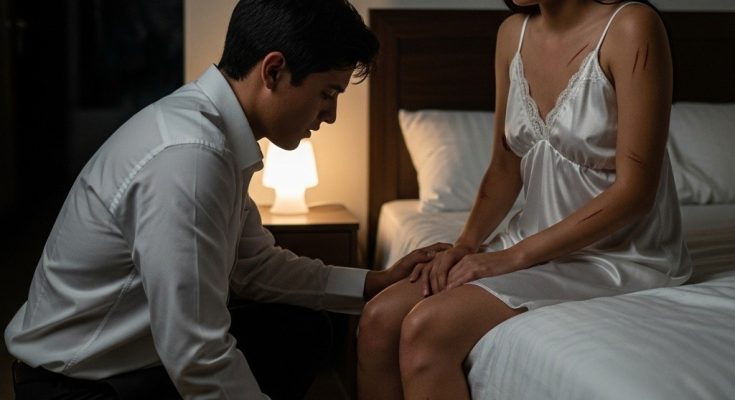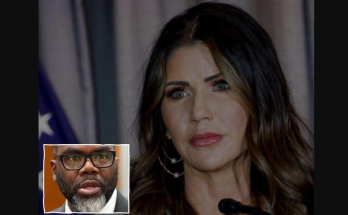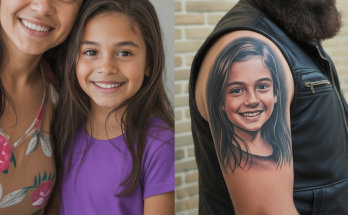The music had faded, the guests had gone home, and the echoes of laughter still lingered in my heart. I—Alejandro—was the happiest man alive. I had just married Marisol, a woman whose kindness and grace had touched everyone who knew her.
That night was supposed to mark the joyful beginning of our shared life. Yet, when we stepped into our quiet bridal suite, something about Marisol’s trembling hands and distant eyes told me that something was deeply wrong.
At first, I thought it was simple nervousness. I smiled, made gentle conversation, and tried to put her at ease. But each time I reached out to hold her, she drew back slightly, whispering that she wasn’t ready.
My heart grew heavy with confusion and concern. I didn’t want to pressure her — I just wanted to understand.
So, I sat beside her, gently asking, “Marisol, what’s wrong? You can tell me anything.”
Her eyes filled with tears, and for a long moment, she said nothing. Then, trembling, she pulled the blanket around herself like a shield. I could feel her fear, though I didn’t know its source.
When I softly placed my hand on her shoulder, she flinched. My heart broke. Something inside me told me she wasn’t just nervous — she was afraid of something deeper.
And when I finally lifted the blanket, what I saw changed my understanding of love forever.
Beneath the soft light, I noticed faint scars along her arms and back — old, healed, but unmistakably real. I froze, not out of horror, but out of heartbreak. She looked at me with tearful eyes, as if bracing for rejection.
Instead, I knelt in front of her and said, “Marisol, please forgive me if I’ve done anything to scare you. I would never hurt you. But… what happened to you?”
Through quiet sobs, Marisol told me her story. She had lost her parents as a child and had grown up with distant relatives who treated her cruelly. Each scar carried the memory of neglect and fear. She had built a new life, but deep inside, she still carried the pain of the past.
When she finished speaking, I took her in my arms. “Marisol,” I whispered, “your scars do not define you. They are proof that you survived. I love you for who you are — for your strength, your courage, and your heart.”
That night, instead of romance, we found something far more powerful — understanding, trust, and healing.
We moved into a small yellow house outside Guadalajara — not perfect, but full of warmth.
Marisol’s laughter slowly returned, and each morning she filled our kitchen with the smell of coffee and cinnamon.
One evening, while painting a nursery, she asked softly, “Do you really think I’ll be a good mother?”
“Marisol,” I said, smiling, “any child who has you will never know loneliness.”
Her eyes filled with tears, but this time, they came with hope.
Months later, a letter arrived from her hometown — a reminder of the family who had once failed her. They wanted her testimony in a court case.
“I can’t face them,” she whispered.
“Then we’ll go together,” I told her.
When she finally stood in court and spoke her truth — calmly, honestly, without bitterness — the entire room fell silent. For the first time, she faced her past and walked away free.
But life has its storms. The stress of reliving those memories made Marisol ill. Sleepless nights and fevers followed.
One night, she asked me, “Do you ever regret marrying me?”
“Never,” I said. “You taught me what love really means. It’s not fireworks or perfection — it’s patience. It’s choosing each other even when things hurt.”
A year later, we received the news that changed everything — Marisol was expecting.
When the doctor said, “She’s healthy, strong heartbeat,” Marisol’s joy lit up the room.
But complications came late in the pregnancy. The doctors warned that surgery might be necessary. I prayed harder than I ever had.
Hours later, when I heard our baby’s first cry, I fell to my knees. Both Marisol and our daughter, Lucia, had made it.
Marisol once hid her scars. Now, she carried new ones — symbols of life and hope.
As Lucia grew, Marisol began writing her letters: lessons about kindness, forgiveness, and courage. “For when she’s older,” she said.
In one, she wrote:
“I once thought my scars made me unworthy. But your father showed me that scars are where love enters. Never hide them.”
Years later, as we sat watching sunsets from our porch, Marisol asked softly, “Do you ever think about that night — our wedding night?”
“Every day,” I said. “That’s when I learned that love is about seeing someone completely — and choosing them anyway.”
She smiled. “Promise me, if I’m gone before you, tell Lucia I wasn’t broken. Tell her I was loved.”
I kissed her hand. “You’ll tell her yourself.”
But one morning, I woke to find Marisol peacefully gone.
At her memorial, Lucia read one of her mother’s letters:
“Love is not the absence of pain. It’s what makes pain bearable. Never hide from life — let love transform it.”
Years later, on Lucia’s wedding night, I gave her a gift: the same blanket her mother once held close.
Inside was a note:
“This blanket once hid fear. Now let it cover your love — not to hide, but to remind you that trust is where real love begins.”
Lucia called the next morning, voice trembling.
“Papa, I understand now. Mama’s scars… they were her story.”
I smiled through tears. “Yes, my love. And she wrote the most beautiful ending.”
Now, when the evening breeze carries the faint echo of her laughter, I know Marisol’s love still lives here — in every scar, every sunset, every act of kindness we pass on.
Love, I’ve learned, is not about flawless beginnings.
It’s about two souls who choose to stay — scars and all — and build something stronger together.




